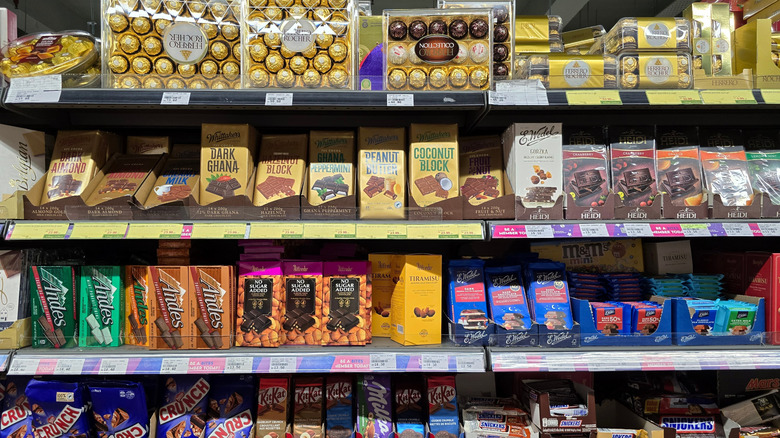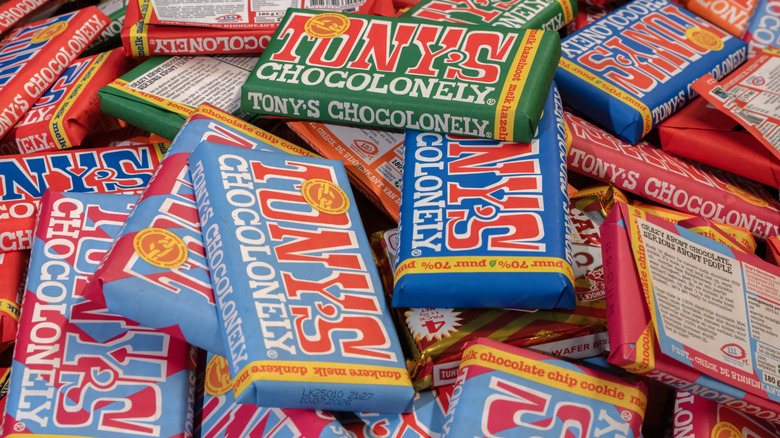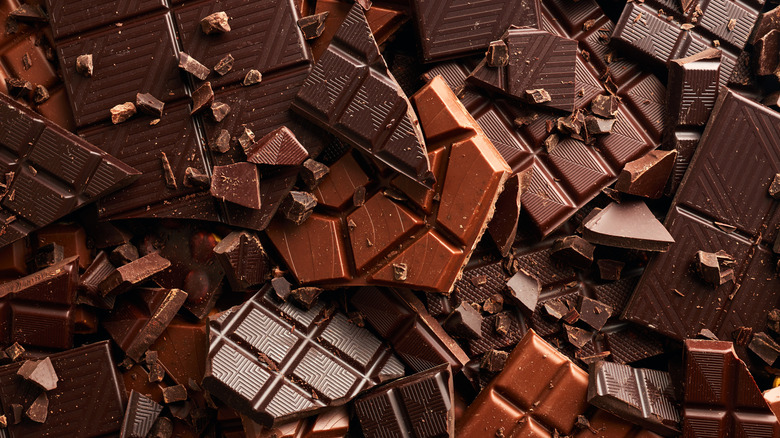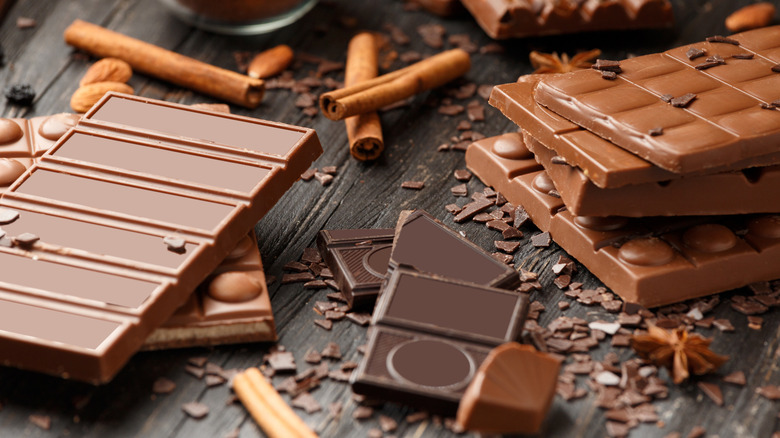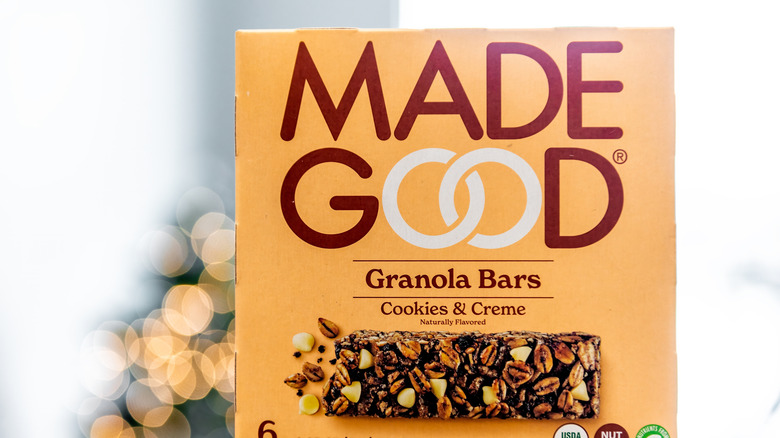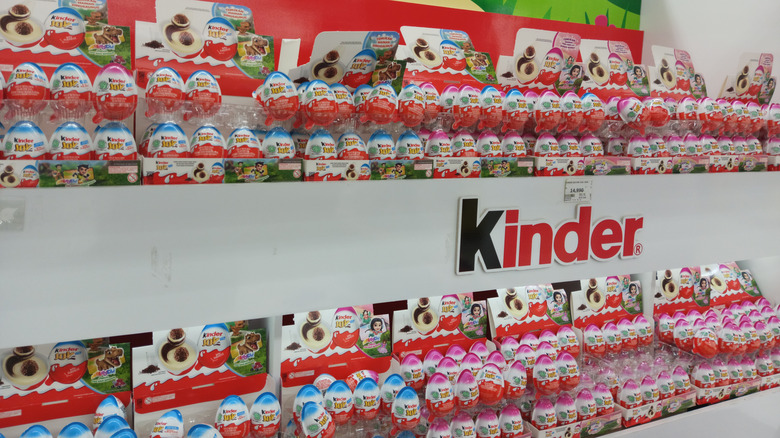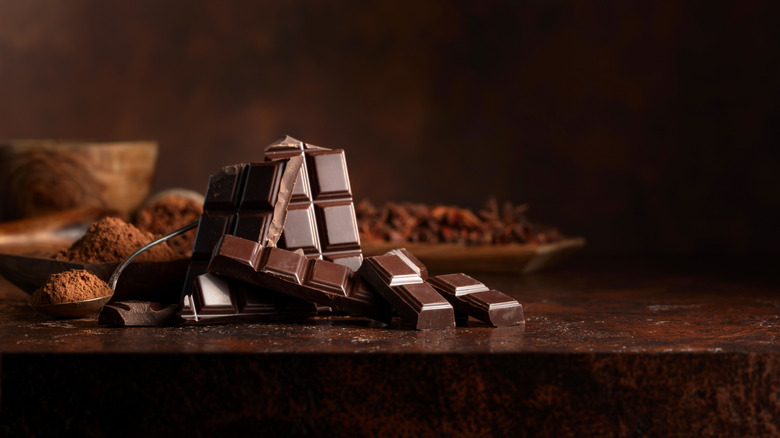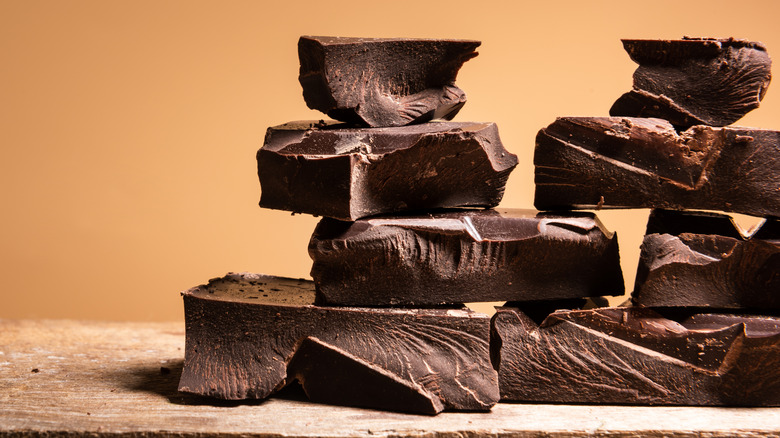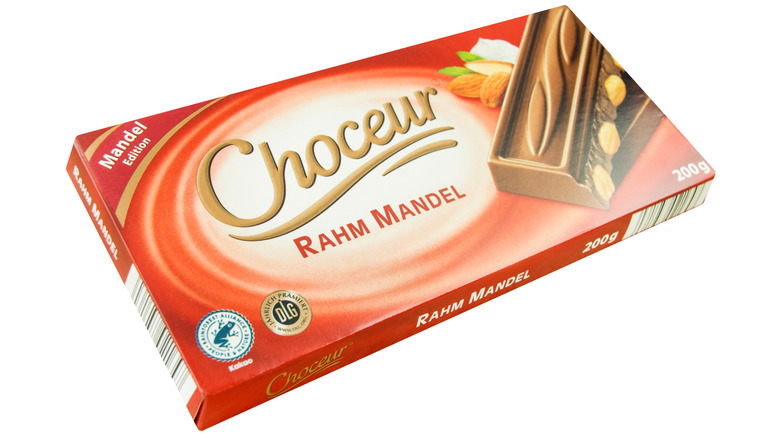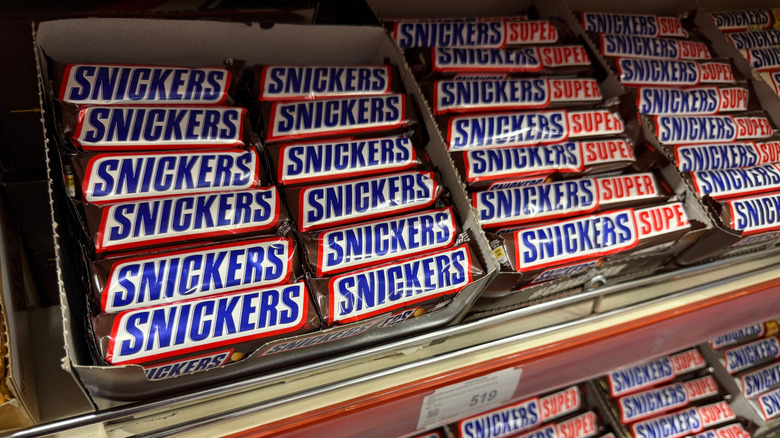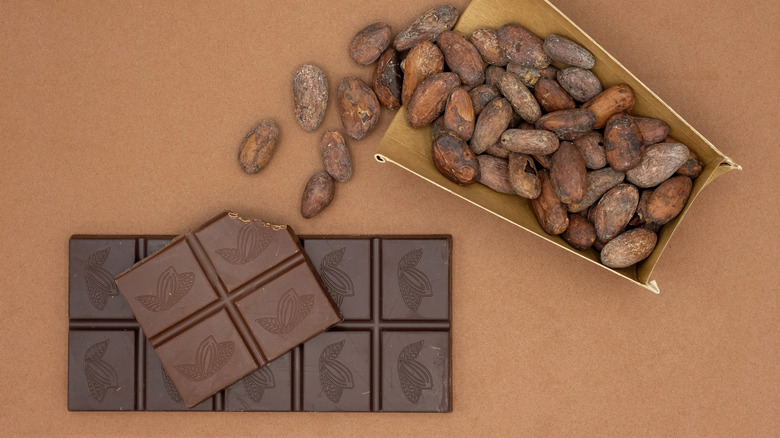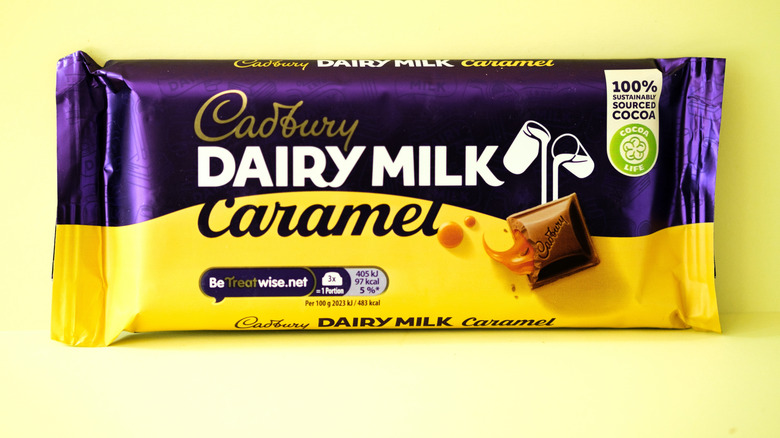The 14 Worst Chocolate Recalls In Candy History
If you're on the hunt for a dessert so good it once doubled as currency in ancient Aztec civilization, then chocolate's got you covered. You don't really need to do much to enjoy it either — whip it up with some heavy cream and you've got a silky ganache glaze for your baked goods, or eat it straight out of the pack; there's really no wrong way to get your fix of that delectable melt-in-your-mouth chocolate goodness.
But here's the bitter catch: Sometimes, splurging on a bar of chocolate can bring a lot more trouble than it's worth. Just how much trouble? Think emergency room visits, lawsuits, and international recalls spanning millions of pounds of product. And because it's just not right to make such wild chocolate allegations without proof, here's a rundown of some of the worst ways your favorite treats have found themselves on the recall list.
Tony's Chocolonely (2025)
Chocolate-coated almonds — just one of the many grand chocolateering inventions that could actually make you go nuts for chocolate. But don't get too wrapped up in the fun crunch, because it is quite possible to chip your tooth on one. And if that sounds a bit far-fetched, just ask customers of Tony's Chocolonely, who in April 2025 had to contend with the idea that their favorite chocolate-almond treats could actually contain small bits of stone.
Known for its hardline stance against slavery in the chocolate industry, the company made the unsettling discovery after multiple reports from consumers outside the United States. Two favorites were affected: Dark Chocolate Almond Sea Salt Bar and the Everything Bar. A recall was issued, and consumers were promptly notified through the company's Instagram page on April 1.
The company chalked the mishap up to a defect in a third-party almond supplier's filtering process. Without proper filtering, it's not unusual for bits of gravel and other debris to sneak into the mix.
Cal Yee Farm (2025)
If you're among the estimated 6% of American adults with a food allergy, then shopping for chocolate treats might involve a lot more than checking the cocoa content. And because chocolate bars can contain any number of known allergens, including wheat, nuts, and dairy, you might find yourself scanning the ingredients list a lot more carefully than the average shopper. However, this might just turn out to be an exercise in futility if the manufacturer inexplicably omits said known allergens from the ingredients list. Among the most alarming examples of such an oversight happened in January 2025 and involved California-based confectioner Cal Yee Farm.
Alarm bells started going off after an FDA inspection revealed that multiple confectionaries manufactured by the company, including up to five variations of chocolate-coated treats, had been sold in packaging that did not declare that they contained known allergens like milk, soy, peanuts, wheat, and sesame. The products, which were already on the shelves of stores in multiple states, including Arizona, Virginia, Tennessee, New Mexico, California, and Ohio, were consequently removed from circulation under a Class I recall; reserved for products with the potential to cause severe health consequences or even death if consumed.
Prophet Premium Blends, LLC (2024)
If you don't mind a bit of a trip with your chocolate bar, then you might want to nip to your local vape shop and stock up on Diamond Shruumz chocolate bars. Or ... maybe don't, because Prophet Premium Blends LLC, the makers of these treats, might've reimagined chocolateering with a tad more psychedelics than is safe. Marketed as microdosing candies, these gray-market chocolate bars found themselves on the recall list in late 2024 after they were implicated in a multi-state public health disaster that sickened 180 people and potentially caused three deaths.
Although the exact culprit behind the illnesses remains a mystery, FDA testing revealed the chocolate bars to contain excessive amounts of muscimol, a psychedelic compound that can cause nausea, dizziness, hallucinations, space distortion, tiredness, and even death if consumed in high enough quantities. Also found in the chocolate bars was a psychoactive substance similar to the psilocybin found in mushrooms, along with multiple Kava plant derivatives, which may have contributed to the severity of symptoms observed. Also on the FDA's list of suspects was ibotenic acid, which, though rather difficult to test for, elicits symptoms mimicking those observed in many of those affected, including rapid heart rate, agitation, and seizures.
Riverside Natural Foods (2024)
Hats off to granola bars for being the perfect on-the-go snack for those days when you just can't spare a moment from your hectic itinerary. Though it's always a great idea to double-check the label and UPC codes on your chocolate granola bar, because — like customers who purchased Riverside Natural Foods' MadeGood granola bars in December 2024 — you might just find that it's been part of a massive international recall ... just in time to get actual lunch. This particular recall kicked off after seven consumers reported finding metal fragments in their granola bars. As a result, a startling 2,408,883 cases of the popular snacks spanning multiple categories, comprising up to 14 chocolate varieties, were pulled from stores worldwide, including the United States and Canada.
In a statement published on its website, Riverside Natural Foods explained that the metal fragments, which were described as flat and bristle-like, were not likely to be present in all their products, as they'd only been reported in a handful of the millions already on store shelves. Though it remains unclear exactly how the metal fragments made their way into the popular treats, the company claimed they'd conducted a thorough review of their manufacturing process and rectified the defect that caused the mishap.
Clasen Quality Chocolatier Inc. (2024, 2023)
Though you might not be able to save it from becoming a gooey mess, chocolate is unlikely to go bad, even if you store it directly in front of a furnace. But that doesn't mean it can't give you a debilitating case of food poisoning, because like practically every food in existence, it's not safe from Salmonella. Fans of Wisconsin-based confectioner Clasen Quality Chocolatier learned this the hard way in April 2024, when it found itself pulling a startling 4,383,201 pounds of chocolate products spanning 10 categories off the shelves due to potential contamination with Salmonella.
Although the products were already on the shelves of stores across nine states, including Utah, Georgia, California, and Illinois, no cases of Salmonella poisoning were reported. Still, the recall wasn't without consequence. For the most part, it cast doubt on Clasen Quality Chocolatier's quality control standards, especially in light of the fact that the company had already pulled an additional 2,235,990 pounds of chocolate products from the shelves just a year prior due to undeclared peanut allergen.
Meijer and Lamontagne Chocolate Corporation (2023)
Long gone are the days when having a milk allergy meant you couldn't just pick out any old snack from your local grocery store aisle for fear of coming down with severe anaphylaxis from something that has no discernible reason to contain milk, but surprisingly does. Not only are there a barrage of milk alternatives to pick from, but nowadays, food manufacturers are mandated by law to list all known allergens on product packaging.
But sometimes even legislation isn't enough to keep the threat of severe allergic reactions at bay, as became evident in May 2023 when supercenter chain Meijer Inc. and Canadian chocolatier Lamontagne Chocolate Corporation were forced to recall two varieties of dark chocolate treats — Frederik's Dark Chocolate Almonds and Meijer Express Go Cup Dark Chocolate Almonds — for undeclared milk allergen.
Depending on the degree of sensitivity, people with milk allergies can sicken rather quickly after consuming products containing even minute quantities of dairy. And if such exposure happens off the cuff — like when someone randomly grabs a chocolate-coated almond on the go — the possibility of adverse outcomes like anaphylactic shock or even death becomes alarmingly real. Thankfully, Meijer and Lamontagne's mislabeling error didn't snowball into a public health disaster, which is a solid win, especially considering the mislabeled products were already on Meijer store shelves in multiple states, including Michigan, Kentucky, Illinois, and Ohio prior to the recall.
Ferrero USA (2022)
Nothing screams Easter quite like a Kinder egg, and with a global presence spanning a whopping 150 countries, Ferrero — the makers of the highly sought-after treats — has the market firmly cornered and tucked away. But as the company came to learn in April 2022, even with such lush pickings, the stealthy saboteur that is Salmonella is never really far off.
Things started going south when reports surfaced of a single case of Salmonella in the UK, later traced to Kinder products — including Kinder Surprise, Kinder Mini Eggs, and Kinder Schokobons — manufactured at Ferrero's Arlon, Belgium plant. By the close of April, the outbreak had gone global, with more than 200 people sickened across 11 countries, including Belgium, Ireland, Sweden, France, Germany, Austria, and the United States. Ferrero quickly issued a recall for the tainted products. But that alone wasn't enough to assuage Belgian food safety authorities, who speedily slammed the brakes on the Arlon site until its food safety practices were brought up to par.
Thankfully, Ferrero made quick work of cleaning house, and after scrubbing down over 10,000 parts, passing a startling 1,800 safety tests, and replacing a ton of broken machinery (including a whopping 300 meters of piping), the plant was finally green lit to resume operations just months later.
Strauss Group (2022)
Ferrero Rocher, Kit Kat, Lindt — just some of the many brands American chocolate lovers who keep Kosher can reach for. But head over to Israel, and you'll find a different roster of sought-after labels with names like Shtix, Mekupelet, and Kif Kef. These and many more Kosher-certified chocolate candies are the handiwork of the Strauss Group, a major player in Israel's candy scene. And if you follow the highs and (mostly) lows of the Israeli confectionery industry, then you might already know that Strauss was once almost brought to its knees by — surprise, surprise — a rather brutal Salmonella recall.
Initially spanning over a dozen Elite brand chocolate labels and later expanded to include a wide array of candies and gums, this recall was so massive it forced the company to halt activities at its manufacturing plant in Nof Hagalil. The plant was brought up to code within months, but it took a lot longer for Strauss to regain its once-dominant presence in the Israeli confectionery market.
Among other woes, the recall dented Strauss's market capitalization by a whopping $300 million in three days, slashed gross profit to 29.8% in 2022 compared to 36.9% in 2021, and reduced its share in the Israeli confectionery market from 12.2% to 10.7% in just months. In all, it took the company more than a year to recover from the recall. Just goes to show you how much havoc Salmonella is capable of wreaking.
Barry Callebaut (2022)
Belgium might not make the most chocolate in the world, but it's certainly home to the biggest chocolate manufacturing plant on the planet. And this is where Salmonella decided to set its sights in 2022. This time, it snuck in through a bad batch of lecithin purchased from a Hungarian supplier and delivered via a third party. Although the exact point of contamination was not immediately decipherable, Barry Callebaut, the Swiss chocolatier behind the famous Wieze plant, took swift steps to remedy the situation before it snowballed into a full-blown public health disaster.
The company suspended all activities at the Wieze plant, blocked all products that had already been manufactured with the tainted lecithin batch from distribution, and immediately began extensive cleanup to remove all traces of the bacteria from the plant. Production at the Wieze plant remained on hold from July all through November, impacting distribution in multiple regions around the world, and costing the company a whopping $77 million. On the bright side, none of the tainted products ever reached an unsuspecting consumer — which is a huge break, considering Barry Callebaut supplies some of the biggest players in the chocolate scene, including Nestlé, Hershey, and Unilever.
Coblentz Chocolate Company (2022)
Given the ease with which it's able to sneak into foods, it's always great news when a recall spurred by Salmonella doesn't spiral into a full-blown disease outbreak. But that's not the only downside to having Salmonella-tainted products in circulation. After all, the supply chain doesn't always end at the grocery store aisle; companies also sell to each other. Without proper quality control, a recall involving a seemingly fringe product can cascade through the industry until it finds its way to a brand you just happen to have in your pantry.
That's exactly what happened in May 2022 after food giant J.M. Smucker Corporation recalled 49 variations of JIF peanut butter for Salmonella contamination. The tainted peanut butter wasn't linked to any cases of food poisoning, but the crisis didn't end there. Hot on its heels came an announcement from Ohio-based chocolatier Coblentz Chocolate Company: It had used JIF peanut butter to whip up 18 categories of chocolate treats, which, unfortunately, meant those products were subject to recall too. Thankfully, this turned out to be one of those rare moments where consumers dodged the Salmonella bullet twice, as no cases of food poisoning were linked to this recall either.
Aldi (2017)
Every chocolate lover perhaps dreams of someday having the wherewithal to bathe in dark chocolate, but sometimes budget constraints are such that only your taste buds get to be slathered — and not in something extravagant like To'ak Chocolate. Sometimes you only have the means to spring for a treat that's not just dark chocolate in name and color only. That's where Choceur Dark Chocolate comes in. With cocoa concentrations ranging from a decent 49% to a delectable 72%, and prices between $0.85 to $1.29, this Aldi-exclusive brand is a great way to satisfy your dark chocolate cravings without breaking the bank.
Sadly, December 2017 was not a great year to spring for a Choceur chocolate bar at Aldi, as one variety of the sought-after treats was subject to recall due to undeclared almonds. With an estimated 9–15% of the American populace allergic to almonds and Choceur being a pretty sought-after grocery store dark chocolate, the possibility of adverse outcomes was incredibly high. Thankfully, no allergic reactions were reported as a result of consuming the mislabeled chocolate.
Mars Inc. (2016)
Plastic; it's everywhere. The United Nations Environment Programme estimates that up to 23 million tonnes of plastic leach into ecosystems yearly, eventually degrading into microplastics that end up in food, water, and even air. The grim reality is that plastic will make its way into your body no matter how careful you are.
But of course, that doesn't mean food authorities have adopted a laissez-faire attitude toward plastic contamination. Finding bits of plastic in something you picked up from the grocery store is still a pretty huge deal — as was evident in 2016 when confectionery industry heavy-hitter Mars Inc. was forced to recall Snickers, Mars, and Milky Way bars from 55 countries after customers in Germany reported discovering plastic fragments in a Snickers bar.
This wasn't the first time — or the last time — plastic contamination would turn the food industry on its head (just ask anyone who remembers Trader Joe's soup dumpling recall). But it was the first time plastic spurred a recall on such a massive global scale. That meant Mars Inc. became something of a guinea pig for just how damaging a little bit of plastic could be. Experts pegged the financial losses in the millions, but with Mars Inc. being unlisted, it's anyone's guess how much of a hit the company really took — though it was, no doubt, pretty massive.
Dagoba Organic Chocolate (2006)
Lead exposure can carry some damaging and lasting health consequences — especially for young children, whose developing brains are extremely sensitive to lead toxicity. And these days, the culprit's not just vintage dinnerware or peeling old paint; your favorite chocolatey treats are also on the long list of suspects.
Lead contamination in the chocolate industry is old news. Major brands like Starbucks and Nestlé have come under fire for carrying chocolate products with elevated lead levels. Yet, despite lawsuits and mounting public outcry, nary a single product has been pulled off the shelves due to lead contamination — at least not in recent history.
But it wasn't always this way. Back in 2006, Oregon-based chocolatier Dagoba Organic Chocolate took the rare step of recalling six categories of its organic chocolate bars after they were found to contain lead levels surpassing acceptable thresholds. Still, since the effects of lead exposure are cumulative, often indirect, and take years to manifest, it's anyone's guess just how much of a health impact the tainted bars actually had.
Cadbury-Schweppes (2006)
Cadbury-Schweppes' legacy as a chocolatier is unmatched. After all, it did give the world the grand tradition of packaging Valentine's Day candies in heart-shaped boxes. But like many corporate giants, their reputation hasn't always been spotless. Take 2006: A year that kicked off with the company discovering Salmonella in multiple batches of chocolate manufactured at its Marlbrook plant in the United Kingdom. Despite the obvious risks of having tainted chocolate sitting on store shelves, Cadbury didn't admit to the issue until July; a time well past the expiration dates on the contaminated products.
In total, 1 million products spanning multiple categories were eventually recalled. But the damage was already done: 42 people had contracted Salmonella. Cadbury went on to spend £20 million bringing the Marlbrook plant up to code, but this wasn't enough to appease UK authorities. By July 2007, Herefordshire and Birmingham city councils had filed nine charges against the company. Cadbury pleaded guilty and forked over more than £1 million in fines — chump change for a company now valued in the tens of billions.

